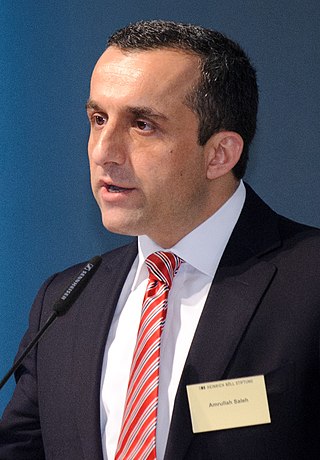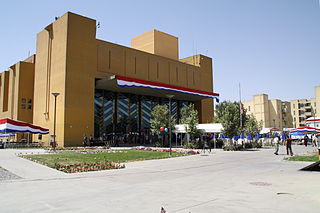The 2003 attack on the Pakistan Embassy in Kabul occurred when up to 500 Afghan protesters overran the embassy of Pakistan on 9 July 2003. [1] It was the second major attack since 1995, when the embassy was also assaulted by Afghan protesters.
The 2003 attack on the Pakistan Embassy in Kabul occurred when up to 500 Afghan protesters overran the embassy of Pakistan on 9 July 2003. [1] It was the second major attack since 1995, when the embassy was also assaulted by Afghan protesters.
The prior demonstration and protests against the alleged border incursions by Pakistan Armed Forces culminated in the attack and ransacking of the premises. The protesters shattered windows, broke down doors, and set the Pakistan flag on fire. [2] No one was injured. [3] The High Commissioner Rustam Shah Mohmand of Pakistan accused the Afghan government of being unable to police its own capital, demanding compensation and announcing the embassy would remain closed. [4] After the incident, Afghan President Hamid Karzai officially apologised for the rampage and made a personal apology during a 25-minute conversation, stating that no such incident would happen again. [5]
At approximately 9:30 AM, 500 protesters chanting "Anti-Pakistan slogans" descended on the Pakistan High Commission building. [6] Testimony of nearby Western diplomats and staff revealed that Afghan officials were aware of the protest, though they apparently assigned no extra security. [7]

Hamid Karzai is an Afghan statesman who served as the fourth president of Afghanistan from July 2002 to September 2014, including as the first elected president of the Islamic Republic of Afghanistan from December 2004 to September 2014. He previously served as Chairman of the Afghan Interim Administration from December 2001 to July 2002. He is the chief (khān) of the Popalzai Durrani tribe of Pashtuns in Kandahar Province.

Gulbuddin Hekmatyar is an Afghan politician, and former mujahideen leader and drug trafficker. He is the founder and current leader of the Hezb-e-Islami Gulbuddin political party, so called after Mohammad Yunus Khalis split from Hezbi Islami in 1979 to found Hezb-i Islami Khalis. He twice served as prime minister during the 1990s.

The Durand Line, also known as the Afghanistan–Pakistan border, is a 2,640-kilometre (1,640 mi) international border between Afghanistan and Pakistan in South Asia. The western end runs to the border with Iran and the eastern end to the border with China.
During the War in Afghanistan, according to the Costs of War Project the war killed 176,000 people in Afghanistan: 46,319 civilians, 69,095 military and police and at least 52,893 opposition fighters. However, the death toll is possibly higher due to unaccounted deaths by "disease, loss of access to food, water, infrastructure, and/or other indirect consequences of the war." According to the Uppsala Conflict Data Program, the conflict killed 212,191 people. The Cost of War project estimated in 2015 that the number who have died through indirect causes related to the war may be as high as 360,000 additional people based on a ratio of indirect to direct deaths in contemporary conflicts.
Brahamdagh Khan Bugti or Brahumdagh Khan Bugti is the founder and leader of the Baloch Republican Party, a Baloch nationalist group which broke away from his uncle Talal Akbar Bugti's Jamhoori Watan Party in 2008. He is the grandson and tribal successor of Nawab Akbar Bugti, former chief minister and governor of the Balochistan province. He campaigns for the rights of Baloch people around Europe. As of 2018, he was living in self-imposed exile in Switzerland.
The following lists events that happened during 2002 in Afghanistan.
The following lists events that happened during 2004 in Afghanistan.

Afghanistan and Pakistan are neighboring countries. In August 1947, the partition of British India led to the emergence of Pakistan along Afghanistan's eastern frontier; Afghanistan was the sole country to vote against Pakistan's admission into the United Nations following the latter's independence. Territorial disputes along the widely known "Durand Line" and conflicting claims prevented the normalization of bilateral ties between the countries throughout the mid-20th century. Afghan territorial claims over Pashtun-majority areas that are in Pakistan were coupled with discontent over the permanency of the Durand Line which has long been considered the international border by every nation other than Afghanistan, and for which Afghanistan demanded a renegotiation, with the aim of having it shifted eastward to the Indus River. During the Taliban insurgency, the Taliban has received substantial financial and logistical backing from Pakistan, which remains a significant source of support. Nonetheless, Pakistan's support for the Taliban is not without risks, as it involves playing a precarious and delicate game. Further Afghanistan–Pakistan tensions have arisen concerning a variety of issues, including the Afghan conflict and Afghan refugees in Pakistan and water-sharing rights but most of all the Taliban government in Afghanistan providing sanctuary and safe havens to Pakistani Taliban terrorists to attack Pakistani territory. Border tensions between Afghanistan and Pakistan have escalated to an unprecedented degree following recent instances of violence along the border. The Durand Line witnesses frequent occurrences of suicide bombings, airstrikes, or street battles on an almost daily basis. The Taliban-led Afghan government has also accused Pakistan of undermining relations between Afghanistan and China and creating discord between the neighbouring countries.

The 2008 Indian embassy bombing in Kabul was a suicide bomb terror attack on the Indian embassy in Kabul, Afghanistan on 7 July 2008 at 8:30 AM local time. The bombing killed 58 people and wounded 141. The suicide car bombing took place near the gates of the embassy during morning hours when officials enter the embassy.
The 2009 NATO Afghanistan headquarters bombing occurred on August 15, 2009, when a Taliban suicide bomber detonated himself outside the NATO headquarters in Kabul, Afghanistan. The bomber killed at least seven people and injured 91.
The 2009 Kabul Indian embassy bombing was a suicide bomb attack on the Indian embassy in Kabul, Afghanistan on 8 October 2009 at 8:30 am local time. The bombing, claimed by the Taliban, killed 17 people and wounded 83.

Amrullah Saleh is an Afghan politician who served as the first vice president of Afghanistan from February 2020 to August 2021, and acting interior minister from 2018 to 2019. He was the head of the National Directorate of Security (NDS) from 2004 to 2010.

The Embassy of the United States of America in Kabul was the official diplomatic mission of the United States of America to the Islamic Republic of Afghanistan. Its chancery on Great Massoud Road in the Wazir Akbar Khan neighborhood of the Afghan capital of Kabul was built at a cost of nearly $800 million.
Events from the year 2011 in Afghanistan.
2003 in Afghanistan. A list of notable incidents in Afghanistan during 2003

The 2011 Afghanistan Ashura bombings were a pair of bombings in the Afghan capital of Kabul and Mazar-e-Sharif. The Kabul suicide bombing took place at around noon local time, on the day when Muslims commemorate Ashura, an annual holy day throughout the Muslim world particularly by the Shi'a Muslims.

Events from the year 2012 in Afghanistan.

The April 2012 Afghanistan attacks took place on Sunday, 15 April 2012, at around 13:00 local time when heavily armed Taliban insurgents and suicide bombers launched multiple coordinated attacks throughout Afghanistan. Insurgents launched the 2012 spring offensive on multiple locations, including government buildings, military bases, and embassies. Attacks occurred in four Afghan provinces, including Kabul and Paktia. Different reports attribute responsibility for the attacks to either Taliban or the Haqqani network although the Taliban have claimed responsibility.
On 8 March 2017, the Sardar Daud Khan Military Hospital in Kabul, Afghanistan, was attacked by a group of gunmen, some of them dressed in white hospital robes. Government officials confirmed at least 49 people were killed in the hours-long assault, while 63 others were injured. By March 13 the unconfirmed death toll had surpassed 100, with an unknown number injured. The Islamic State of Iraq and the Levant claimed to have carried out the attack, but officials suspected the Haqqani network instead.

The Embassy of Pakistan in Kabul is the diplomatic mission of Pakistan in Afghanistan. Pakistan also operates consulates in the Afghan cities of Herat, Jalalabad, Kandahar and Mazar-e-Sharif.